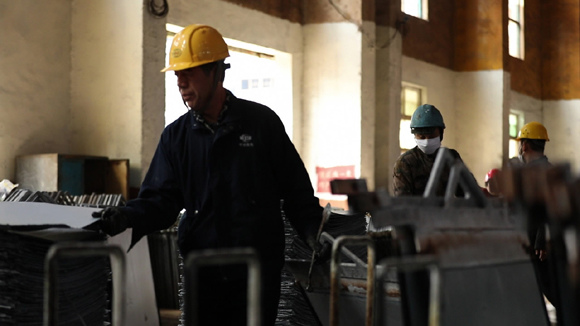
Zhong has worked for over three decades doing manual work in the local factory. His age is beginning to catch up with him. (Photo/CGTN)
Northeast China was once China's powerful and important industrial base, but now it has become a rust belt, its growth bogged down, its resources running dry, and the shut-down of cumbersome state owned enterprises.
For 52-year-old Zhong Yilin and others in Huludao, Liaoning Province, life has never been easy, and it is getting more difficult by the day. He has been working 8 hour days, 6 days a week since joining the state owned zinc factory in 1993. Intense physical labor is becoming increasingly demanding for Zhong.
The plant where Zhong works was once the largest of its kind in Asia. It suffered all the pitfalls of a large state owned firm from its era - hugely over-staffed and making products that are not market competitive. Three years ago, it was on the verge of bankruptcy and thousands of workers like Zhong were earning minimum wages. All 7,000 employees could have lost their jobs if the reform failed.
"2009 was a tough year for us. My eldest daughter had just started university and my wife wasn't working because of illness. We had to borrow money to buy daily necessities and pay for tuition", Zhong told CGTN.
Under a planned economy, steelworkers, miners and oil refinery workers in state-owned enterprises (SOEs) were respected in society and received extensive housing, health and education benefits for over half a century. But this has all changed, and none has been spared as reforms targeting non-competitive and inefficient SOEs cut overhead.
After a privatization deal, one company now holds the largest stake in the zinc factory. The first thing they did was improve operational efficiency – the new owner had zero tolerance for corruption and lethargic work attitudes.
Efforts to introduce market forces and strengthen the role of shareholders are making progress: None of the 7,000 workers were made redundant. And Zhong's income is now more than double what he earned in 2009.
The management thinks reform has brought this company back to life with the help of private capital, which brought in technology and managerial expertise. Besides an almost certain threat of poverty if workers get laid off, masses of employed people would also shake up social stability.
The transformation of the zinc factory has lifted thousands of its workers out of poverty. Zhong told us at the end of our visit that his younger daughter has just gone on a vacation in southern China, and he is planning a holiday with both of his two daughters after retirement.


















































